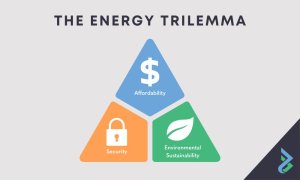
Thought Leadership Articles
Are AI bots the board members of the future?
Exploring AI’s impact on the board room
Thought Leadership Articles
Published 23 November 2023

In the complex realm of energy, the so-called “Energy Trilemma” – the balancing act between sustainability, affordability, and security – has become a pressing concern.
As we stride towards a more sustainable future, the role of advisory boards in navigating these issues is becoming increasingly critical.
The concept of the Energy Trilemma is a fundamental framework within the energy sector, encompassing three core elements:

In the face of the Energy Trilemma, advisory boards can play an instrumental role. Composed of experienced and knowledgeable professionals, these boards can provide strategic guidance, informed perspectives, and valuable insights to organisations.
We recently sat down with Certified Chair™ and Advisory Board Centre Fellow, Stuart Allinson to get his insight on the topic. Combining the experience of his career-long involvement in international energy and environmental markets and his policy role on the board of the Climate Change Authority, Stuart believes advisory boards play a strategic and guiding role in defining clear, long-term strategies to address the Energy Trilemma. They can also assist in identifying investment opportunities in renewable technologies, shape conducive policy and regulation environments, and can help organisations understand the potential impacts of energy transitions, as well as deliver valuable insights into the market dynamics and trends influencing the energy sector.
“Advisory boards play a pivotal role,” Allinson explains. “I’m even seeing energy companies that are trying to navigate towards a zero-carbon future while successfully keeping their shareholders happy, by engaging advisory boards. Primarily, what they’re trying to do is an environmental scan to get the best information and quickly understand what models are out there and what the emerging technologies are, because this is such a fast-moving area.”
Balancing supply chains and resources is another critical aspect of the energy trilemma. Allinson believes advisory boards can guide organisations in developing strategies that ensure a sustainable and secure supply chain.
“Corporates are also engaging advisory boards, but they are looking at the trilemma with a supply chain focus. They’re looking at how they can bring insights and advice into their corporate strategy and strategic planning by understanding how the supply chains operate and how they need to be reconfigured. That, to me, is such a powerful role that we’re already seeing emerge from what I would call corporate advisory boards.”

Unlocking money and markets by fostering investments and shaping conducive policy and regulation is also a key part of the journey towards a sustainable future. Allinson believes that advisory boards, by virtue of their expertise and experience, can play a pivotal role in shaping such policies and attracting investments, particularly for startups.
“The innovators that are growing and that will emerge out of the energy transition will find that an advisory board can help them navigate all the common growth challenges that scaling businesses face in getting commercial traction, getting go-to-market fit, and getting the right investment on board at the right time, so it’s quite a rich landscape for the advisory board community.
Another area where an advisory board can help is stakeholder engagement, which is a particularly delicate issue for many organisations to handle.
“I’m certainly seeing it through my work with the Advisory Board Centre and particularly from the digital community. Successful digital businesses have brought their stakeholders, particularly their customers, into the formulation of product development or business strategy. I see that way of thinking starting to be embraced by the broader corporates and even the not-for-profit sector. They want to know how they factor in the requirements of their broader stakeholder mix into their business strategy, their business decisions and sustainability. Sustainability is a very broad subject, but I see advisory boards as being able to help break that down and analyse and provide great insight and advice into the executive and governance process around how you navigate all this massive change while trying to keep all your stakeholders happy.’
As organisations seek to balance sustainability, affordability, and security, the insights and guidance provided by advisory boards will become increasingly valuable. In this context, the sophistication, and specialisation, that advisory boards bring to the table make them a reliable source of guidance, education, and support in the energy sector.
“I think we’re only at the first 10% of the energy transition there is vastly more to do.” Allinson concludes. “There is complexity in dealing with and navigating the trilemma, which is why we’re seeing more moves towards creating these advisory structures for the very reasons that we’re living in volatile, uncertain and chaotic times.”
From identifying investment opportunities to shaping policy environments, Advisory Boards are helping organisations steer their energy transition. Their contributions underscore the importance of strategic thinking, collaboration, and innovation in addressing the Energy Trilemma. As we continue to grapple with these challenges, the role of Advisory Boards will undoubtedly remain central to our collective efforts to create a sustainable, prosperous, and resilient energy future.

SET UP AN ADVISORY BOARD
